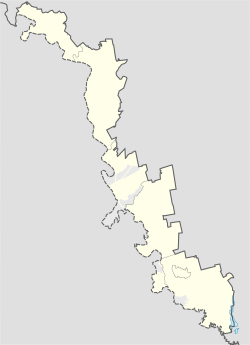Dubăsari
|
Dubăsari Dubossary |
|
|---|---|

Liberal Arts College
|
|
| Location within Transnistria | |
| Coordinates: 47°16′N 29°10′E / 47.267°N 29.167°ECoordinates: 47°16′N 29°10′E / 47.267°N 29.167°E | |
| Country |
Internationally recognised as part of |
| County | Transnistria |
| Population (2004) | |
| • Total | 28,500 |
| Time zone | EET (UTC+2) |
| • Summer (DST) | EEST (UTC+3) |
| Climate | Dfb |
| Website | http://www.dubossary.ru/ |
Internationally recognised as part of ![]() Moldova
Moldova
Dubăsari (Romanian pronunciation: [dubəˈsarʲ]; Moldovan Cyrillic: Дубэсарь) or Dubossary (Russian: Дубоссары; Yiddish: דובאסאר; Ukrainian: Дубоcсари) is a city in Transnistria, Republic of Moldova, with a population of 23,650. The city is under the administration of the breakaway government of the Pridnestrovian Moldavian Republic, and functions as the seat of the Dubăsari (Dubossary) District.
The origin of the town name is the plural form of the Romanian archaic word dubăsar ("boatman"), a derivative of dubă ("a small wooden boat"), so "Dubăsari" means "boatmen".
Dubăsari is the site of one of the oldest settlements in Moldova, and the Transnistrian region. Stone age artifacts have been found in the area, and there are several kurgans (presumed Scythian) around the city. First mentions of modern Dubăsari date to the beginning of the 16th century, as a fair populated by Moldavian peasants. The settlement became part of the Russian Empire in 1792, and was granted city status in 1795. It was part of Kherson Governorate from 1803 to 1922.
...
Wikipedia

